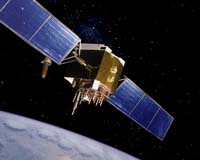 |
Washington (UPI) May 19, 2010 The U.S. National Oceanic and Atmospheric Administration says it is modernizing its Global Positioning System to utilize advances in technology. Scientists at NOAA's National Geodetic Survey -- the official U.S. government source for determining precise latitude, longitude and elevation -- said the effort is important for activities requiring accurate positioning information -- including levee construction projects, the design of evacuation routes in hurricane-prone areas and the forecast of sea level rise in coastal communities. NOAA said the proposed changes will affect civilian-federal mapping authorities, as well as state and municipal governments that have adopted the National Spatial Reference System. "The reference frame in the past was hampered by being held static in time on an Earth that is constantly changing," Juliana Blackwell, director of NOAA's National Geodetic Survey, said. "The new methodologies better capture changes, such as subsidence or sea level rise, and the improved points of reference benefit everyone using positioning data for the foundation of their work." Officials said the estimated value of the modernization efforts is $4.8 billion during the next 15 years, including $2.2 billion in avoidance costs from improved floodplain management.
Share This Article With Planet Earth
Related Links GPS Applications, Technology and Suppliers
 Delta IV GPS IIF-01 Launch Set May 20
Delta IV GPS IIF-01 Launch Set May 20Cape Canaveral FL (SPX) May 18, 2010 The U.S. Air Force will launch the first Global Positioning System Block IIF satellite aboard a United Launch Alliance Delta IV Evolved Expendable Launch Vehicle from Space Launch Complex 37 here May 20. The launch window is 11:29-11:48 p.m. (EDT). The GPS IIF system brings next-generation performance to the constellation. The GPS IIF vehicle is critical to U.S. national security and susta ... read more |
|
| The content herein, unless otherwise known to be public domain, are Copyright 1995-2010 - SpaceDaily. AFP and UPI Wire Stories are copyright Agence France-Presse and United Press International. ESA Portal Reports are copyright European Space Agency. All NASA sourced material is public domain. Additional copyrights may apply in whole or part to other bona fide parties. Advertising does not imply endorsement,agreement or approval of any opinions, statements or information provided by SpaceDaily on any Web page published or hosted by SpaceDaily. Privacy Statement |